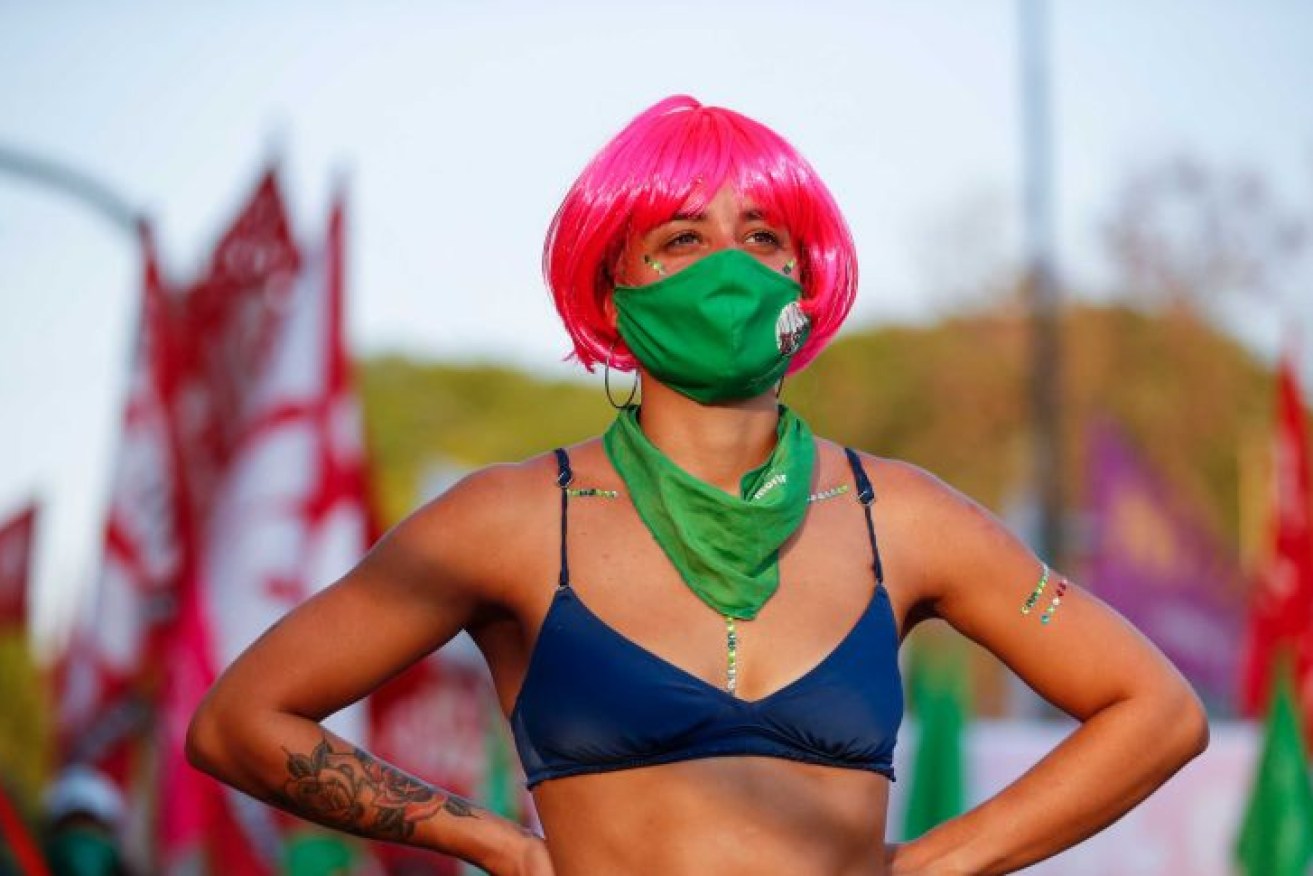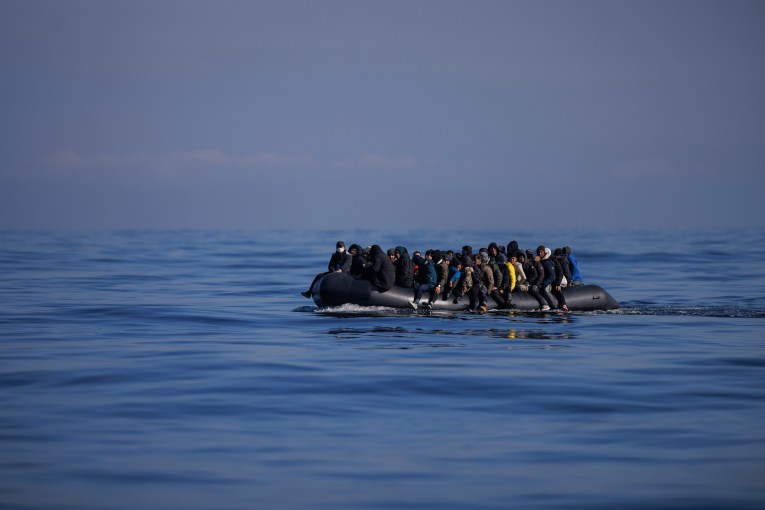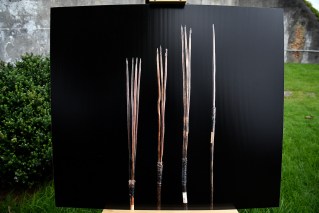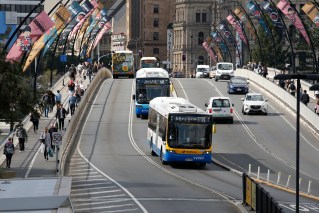Argentina legalises abortion after green wave protests

Abortion rights activists rallied outside Congress as Argentinian MPs debated the abortion bill. Photo: AP
Argentinian politicians have passed a bill to legalise abortion in a groundbreaking move for Latin America, a region that has long opposed the practice on religious grounds.
Currently, women who have an abortion in Argentina – and even those who assist them with the procedure – can face prosecution.
There are only exemptions in cases of rape or if pregnancy poses a risk to the mother’s health.
The new bill, which permits abortions up until the 14th week of pregnancy, faced 12 hours of heated debate in the Senate, reflecting months of national division on the issue.
It passed in the early morning, 38 in favour to 29 against, with one abstention.
‘It means fewer women dying in clandestine abortions’
In the streets of Buenos Aires, where crowds have gathered for days, the vote was welcomed as a sign of progress for women’s rights.

Moira, who declined to give her last name, gathered with protesters outside as the bill was passed to legalise abortion. Photo: ABC News
Moira, who declined to give her last name, was among them.
She said she underwent her own illegal abortion two years ago, taking a pill to end her pregnancy in the seventh week with the support of an underground network of women.
“I was in a situation where doctors wouldn’t help me with my decision, with what I wanted,” she told the ABC.
“Now women don’t have to provide a justification of why they want to have an abortion, now it’s simply their choice, and I think they will be less mistreated.
“It means fewer women dying in clandestine abortions.”
Another activist, 30-year-old Mariana, said it was important to take part in “this struggle … because it surfaced so many things in my family”.
“We’ve been supporting the law and marching for five years,” she told the ABC.
“I’m glad that I can experience this historical moment.”
Only two years ago, nearly one million women took to the streets in what was dubbed a green wave, demanding a change to abortion laws.
A 2018 bill, identical to the one passed today, failed 38-31 with two senators abstaining.
The grassroots movement sprang up again six months later, following the case of an 11-year-old-girl who was impregnated through rape and denied a request for an abortion.

The green wave symbolises the legalisation movement in Argentina and is part of a broader push for women’s rights. Photo: AP
After 23 weeks of pregnancy, the girl, who was called “Lucia” to protect her identity, had to undergo a procedure similar to a caesarean section.
Doctors said they performed the c-section because they thought an abortion would be too risky, but pro-choice groups told the BBC that what happened to Lucia amounted to “torture”.
“Women … were always the most vulnerable members of society,” Moira said of her country’s change.
“This is a huge advancement for women.”

Demonstrators both for and against the bill have come from all over the country to stand vigil in front of the Senate building in Buenos Aires. Photo: AP
The year of women despite a pandemic and economic woes
Lucia’s case and the national conversation around gender violence were credited with the rise of centre-left President Peronist Alberto Fernandez, who made gender equality and abortion rights central features of his successful 2018 campaign.
The President personally lobbied for the passage of the new bill, causing some in the opposition camp to say the abortion movement distracted from the pandemic and contributed to the country’s worst financial crisis in a century.
Mr Fernandez’s electoral success cannot be separated from the rise of the Ni Una Menos (Not One Less) movement, which is Argentina’s answer to the MeToo movement.
Those in Mr Fernandez’s Cabinet credit the social movement with changing hearts and minds.
Vice-President Cristina Fernandez de Kirchner said she was long opposed to legalising abortion before watching women in the “green wave”.
She was set to cast the deciding vote in the event the Senate bill came down to a tie, which looked highly likely given the heat of the debate.
But even once the new laws start to take effect, the practice of abortion will continue to face sharp resistance in Argentina.
A huge change for a region with deep ties to the Catholic Church
Those opposed to the bill had held vigils and prayer groups outside of the capitol in the days leading up to the vote.

Activists opposed to the bill held vigils and prayer groups ahead of the vote. Photo: AP
School teacher Adriana, who did not provide her last name, said she was motivated to protest by the “right to life”.
“More than anything, I’m here to be a spokesperson for that unborn child who has no voice but is alive,” she said.
The passing of the bill holds particular significance in Latin America, which has some of the world’s most restrictive abortion laws in part because of the Catholic Church’s long opposition to the practice.

School teacher Adriana was part of the crowd demonstrating against the abortion bill. Photo: ABC News
In passing the bill, Argentina has become the largest country in the region to allow abortion on demand.
Only three others – Cuba, Guyana and Uruguay – allow elective abortions, according to the Centre for Reproductive Rights, with varying limits on the number of weeks of pregnancy in which an abortion can legally be performed.
Several other countries have outlawed them completely. In El Salvador, women can be sentenced to up to 40 years in prison for getting an abortion.
Pope Francis, who was born in Argentina, has remained firm on the matter. Speaking at a conference last year, he said that it could never be condoned, even when the foetus was gravely sick or likely to die.

The Pope has previously said the opposition to abortion was not a religious issue but a human one. Photo: AP
Just hours before the vote was set to pass, the Pope tweeted that “every outcast is a child of God”.
The Son of God was born an outcast, in order to tell us that every outcast is a child of God. He came into the world as each child comes into the world, weak and vulnerable, so that we can learn to accept our weaknesses with tender love.
— Pope Francis (@Pontifex) December 29, 2020
Will this lead to broader changes in Latin America?
Yet recent studies show religious identity is shifting all across Latin America.
According to the Pew Research Center, more than 90 per cent of Latin Americans identified as Catholic. In 2014, that number was down to 69 per cent.

Activists against abortion have gathered at Plaza de Mayo in Buenos Aires to protest against the decriminalisation of abortion. Photo: AP
Argentina is among the most secular Latin American nations, but the push to legalise abortion is reaching other parts of the region.
In Brazil, a court case considering whether to make abortion legal is set to be heard in the nation’s top court, while Columbia is considering a petition to remove abortion from the penal code.
Chile introduced laws in 2017 that permitted abortion in certain circumstances and activists hope that this may be expanded with the country in the midst of rewriting its constitution.
–ABC








